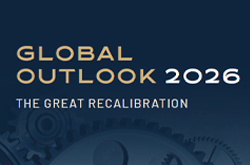Revisiting the investment case for emerging markets makes sense
Download the Indosuez 2020 H1 Global Outlook here
Emerging markets (EM) are a long-lasting investment story that obviously predates the BRIC (Brazil, Russia, India, and China) concept popularised in 2003. The secular story of emerging countries’ convergence to the level of mature markets’ productivity and income per capita gained traction some 15 years ago with China’s growing role in global manufacturing and supply chains around the world.
This story became popular again after the 2008-2009 crisis and the vigour of emerging markets contrasted sharply with the Euro Zone in crisis in 2011. The nature of the story changed: China started to become synonymous with the largest middle class in the world and a highly innovative ecosystem, rather than simply being considered the factory of the world thanks to its cost advantage. 2012 was a symbolic year when the Greek crisis reached its climax and the emerging markets’ contribution to world GDP began to exceed 50%.
Since 2014, however, the secular narrative has been somewhat weakened by several factors, ranging from the excesses of shadow banking and corporate leverage in China to the adverse consequences for emerging markets of US interest rate hikes in 2018, and on to the implementation of protectionist measures initiated by the President of the United States Donald Trump.
What is still true among the structural arguments in favour of the emerging markets case today? Does the promise of strong growth still hold in 2019-2020? What are the potential weaknesses that can be witnessed in terms of policy-mix, reform pace, or industrial strategy that could erode the leadership potential of these countries?
Ahead of the US election, it makes sense to revisit the investment case for emerging markets that has long been a structural conviction of ours.
- The reversal of US monetary policy in favour of renewed accommodation should be a positive catalyst for emerging markets.
- Any weakening of the US dollar could attract flows into cheap emerging currencies offering higher carry and attractive exchange rates.
- A potential resolution of the trade war should be a strong catalyst for financial flows into emerging markets, and could eliminate one source of the global economic slowdown.
- Looking at 2020 and beyond, the foreign policy agenda of the various candidates vying for the Democratic Party’s nomination in the race for the White House suggests this election could be a turning point in the US-China relationship, even if we do not expect that the US will again fully embrace globalisation.
*Editorial of the Indosuez Global Outlook release of 20/01/2020
20 gennaio 2020


